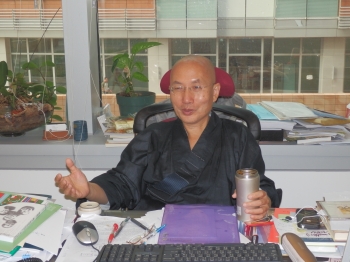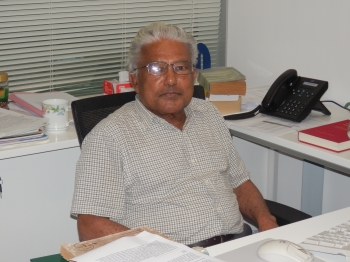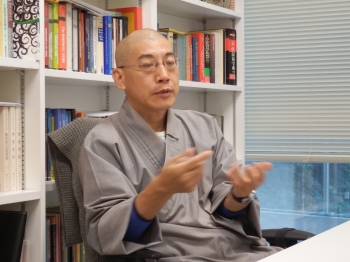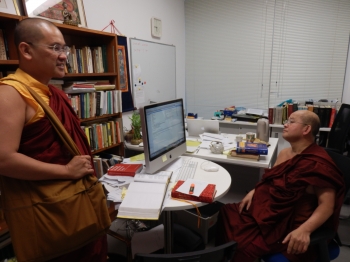– From the Centre’s anniversary brochure
This is an extraordinary milestone for the Centre of Buddhist Studies at The University of Hong Kong. Ten years have gone by since the Centre was founded, with “happiness” as its core focus. And its current Director, Ven. Hin Hung, has continued building on this theme, this year by adding the word “sustainable”. Sustainable happiness is, of course, just a catchier slogan than Nirv??a (because there is no sustainable happiness except Nirv??a). But this apparent marketing is actually a serious pitch to students, alumni, and donors: sustainability is crucial on all levels, from the personal to the academic to the financial. Sustainability is about maintaining the big family of CBS and all its precious relationships. Sustainability is casting an eye to the future while rallying support for current projects and financial needs.
“Walking along the path to sustainable happiness” – this is the message and rallying call of the Centre. And along this path walk many different strollers: students, teachers, tutors, and even those who we don’t usually accredit recognition: administrators, organizers, and others. I asked Ven. Hin Hung if there was any practical change to the courses the professors were offering. Apparently not – the presentation was more or less to stay the same, although there is some potential for the Centre to take over some of the academic topics that retired scholars have left behind (in terms of Buddhist ethics, for example, many pioneers in Britain like Damien Keown have departed, leaving others like Ven. Guang Xing to take up the subject). And the heirs to pioneering and trailblazing new Buddhist ethics for the 21st century couldn’t come sooner: the question is more urgent than ever:
“In the last two decades, advances in science and technology have taken on unprecedented speed, and new modes of communication have changed the way people have lived, worked and interacted with others. Societies have undergone upheaval in financial markets and political change. Consumerism and the quest for material satisfaction have dominated our lives. Traditional values have been challenged. The fast pace of these changes has brought on more uncertainty, unease, stress and anxiety. In the corporate world, there has been not only a trend to search for a more sustainable and ethical way to do business, but also a search to harmoniously relate to others and the environment. On the individual level, there has been an escalating interest in introspection, and a strive for a balance between the ‘spiritual’ and the ‘material’ world. There has been also a growing recognition that physical wellness is connected to the mind. Intelligentsia worldwide has viewed Buddhism as an antidote for the vexed mind and an aid to the establishment of a decent social order.”
It’s not only about the academia. Like any other university department, degree, or course, friends can be made, bonds strengthened at CBS. I don’t think it’s an exaggeration to say that the simple act of taking an MBS, coming to class, and forming ties has changed some people’s lives. I think it’s safe to say that my father was one of those who would not have set out on his own journey to rediscover Buddhism (after an entire adult life of spurning it) without enrolling at the Centre. Many others have gone on to go on pilgrimages with the Centre’s alumni association (CBSAA), or go for regular meet-ups, or even become formal Buddhists.
In the end the Centre is all about the journey of self-discovery. In this way it’s truly sustainable because discovering oneself is a never-ending activity. I think the class intake each year is evidence of this adage: when I was a teaching assistant for a short time in one of the courses, I observed the students to be professionals from all walks of life, mind-bogglingly diverse whilst sharing the common purpose of coming to learn about Buddhism. I think as long as there are people curious about their own lives, and about this ancient religion, the Centre will continue to thrive.
Back to HKU CBS 10th Anniversary homepage
Back to HKU CBS 10th Anniversary homepage


















